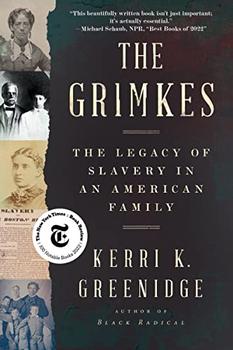Summary | Excerpt | Reviews | Beyond the Book | Readalikes | Genres & Themes | Author Bio

The Legacy of Slavery in an American Family
by Kerri K. Greenidge5. Colored American Magazine, vol. 1, n. 3 (August 1901): 16.
6. Jessie F(auset?) to A. W. Grimke, Buffalo, NY, July 14, 1911, Angelina W. Grimke Correspondence, Box 38-1, Angelina Weld Grimke Collection, Moorland-Spingarn Research Center, Howard University, Washington, DC (hereafter Angelina Weld Grimke Collection).
7. As historian Evelyn Brooks-Higginbotham argues, Black women's "training for parenthood" was deemed essential for both their respectability and for their crucial role in what W. E. B. Du Bois referred to as "home uplift." As an unmarried woman who consciously chose to be childless, Nana Grimke was accused of being "a proponent of race suicide" by many in her circle. See Angelina Weld Grimke, Rachel, [n.d.] 1917, Mss. 4103A, Archibald Grimke Papers; and Brooks-Higginbotham, Righteous Discontent: The Women's Movement in the Black Baptist Church, 1880–1920 (Cambridge, MA: Harvard University Press, 1993), 116–117.
8. W. B. Evans to T. S. Montgomery, Washington, DC, January 3, 1908, Angelina W. Grimke Correspondence, Box 38-1, Angelina Weld Grimke Collection.
9. Evans to Montgomery, January 3, 1908, Angelina Weld Grimke Collection.
10. Indianapolis Freeman, September 19, 1903, 4.
11. M. Fuller to F. J. Grimke, Boston, MA, August 3, 1912, Francis J. Grimke Papers, Moorland-Spingarn Research Center, Howard University, Washington, DC (hereafter Francis J. Grimke Papers).
12. A. Grimke to A. W. Grimke, Washington, DC, September 3, 1911, Angelina W. Grimke Correspondence, Box 38-1, Angelina Weld Grimke Collection.
13. Dr. A. Hamilton to University of Michigan, Benton Harbor, MI, December 16, 1940, Weld-Grimke Family Correspondence, Weld-Grimke Family Papers, William L. Clements Library, University of Michigan, Ann Arbor (hereafter Weld-Grimke Family Papers).
14. "Cairo Mob Is Upheld by Grand Jury's Act," Bureau County Tribune (Illinois), January 14, 1910, 6.
15. "Mob Lynched Two at Cairo," Daily Review (Decatur, IL), November 12, 1909, 1; and "Lynch 2 at Cairo," Pantagraph (Bloomington, IL), November 12, 1909, 1.
16. A. Hamilton to T. Hamilton, Anna, IL, December 16, 1920, Weld-Grimke Family Correspondence, Weld-Grimke Family Papers.
17. As late as 2004, Anna had no Black residents, and the story of its sundown history was well known. Most recently, the scholar Brent M. S. Campney has chronicled how incidents like the 1909 lynching of Froggie James were endemic across "America's heartland" as a form of white supremacist control over Black people after the Civil War. Campney, Hostile Heartland: Racism, Repression, and Resistance in the Midwest (Champaign: University of Illinois Press, 2019). See also James Loewen, Sundown Towns: A Hidden Dimension of American Racism (New York: New Press, 2005), 2–23.
18. A. Hamilton to T. Hamilton, Lincoln, IL, June [n.d.], 1921, Weld-Grimke Family Correspondence, Weld-Grimke Family Papers.
19. Gerda Lerner, The Grimke Sisters from South Carolina: Pioneers for Women's Rights and Abolition (Chapel Hill: University of North Carolina Press, 2004; orig. pub. 1967).
20. Thavolia Glymph focuses on the antebellum plantation household to dissect how white women retained power despite their status as women in a patriarchal society. Similarly, Stephanie Jones-Rogers has expanded on Glymph's thesis through her examination of white women's economic, racial, and personal stake in slaveholding, slave trading, and the perpetuation of Southern slavery. See Glymph, Out of the House of Bondage: The Transformation of the Plantation Household (New York: Cambridge University Press, 2008); and Jones-Rogers, They Were Her Property: White Women as Slaveowners in the American South (New Haven, CT: Yale University Press, 2019).
21. Mark Perry, Lift Up Thy Voice: The Sarah and Angelina Grimke Family's Journey from Slaveholders to Civil Rights Leaders (New York: Penguin, 2002).
22. Enslaved Africans throughout the Americas established kinship networks as a form of social connection (and, in some cases, economic autonomy) beyond the biological bonds of blood relation and family. Here, I am borrowing from extensive work on family and kinship by historians Kendra T. Field and Tera Hunter. Field, particularly, describes kinship as "making freedom real." See Field, Growing Up with the Country: Family, Race, and Nation After the Civil War (New Haven, CT: Yale University Press, 2018), 108; and Hunter, Bound in Wedlock: Slave and Free Black Marriage in the Nineteenth Century (Cambridge, MA: Belknap, 2017), 18–22.
Reprinted from The Grimkes: The Legacy of Slavery in an American Family by Kerri K. Greenidge. Copyright © 2022 by Kerri K. Greenidge. Used with permission of the publisher, Liveright Publishing Corporation, a division of W. W. Norton & Company, Inc. All rights reserved.
Your guide toexceptional books
BookBrowse seeks out and recommends the best in contemporary fiction and nonfiction—books that not only engage and entertain but also deepen our understanding of ourselves and the world around us.